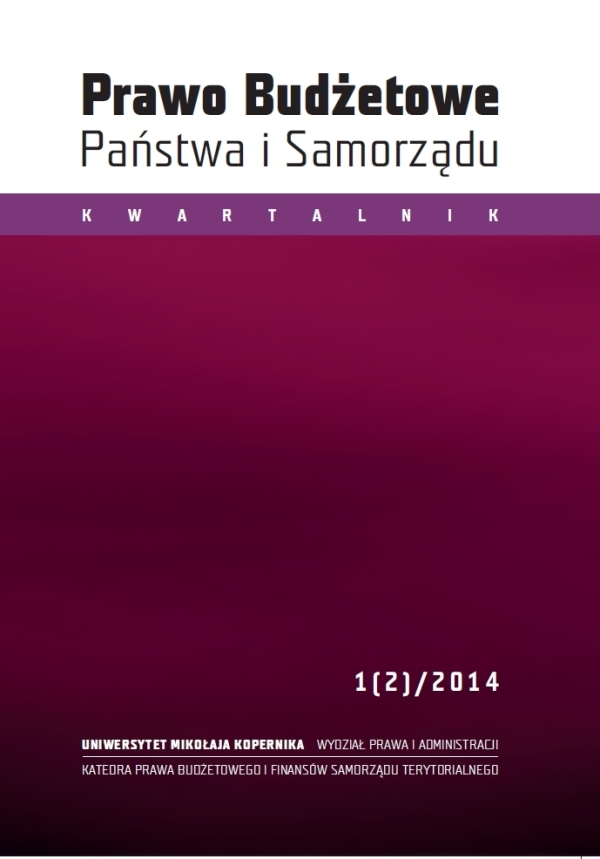Udział mieszkańców w ustalaniu wydatków budżetu gminy w ramach tzw. budżetu partycypacyjnego (na przykładzie Torunia w latach 2013–2014)
DOI:
https://doi.org/10.12775/PBPS.2014.008Słowa kluczowe
budżet partycypacyjny, finanse publiczne, gminaAbstrakt
Budżet partycypacyjny, tworzony przy udziale obywateli współdecydujących o podziale części zasobów finansowych wspólnoty samorządowej, po raz pierwszy został opracowany w brazylijskim mieście Porto Alegre 25 lat temu. W krótkim czasie zyskał dużą popularność w Brazylii i innych krajach Ameryki Południowej. Ok. roku 2000 próby wdrażania budżetu partycypacyjnego podjęto w Europie (Wielka Brytania – 2000, Francja – 2002, Hiszpania – 2003). Pierwszym polskim miastem, które postanowiło rozdysponować część środków zgodnie z propozycjami zgłaszanymi przez mieszkańców, był w roku 2011 Sopot. Obecnie budżet partycypacyjny funkcjonuje w wielu polskich gminach, przede wszystkim miejskich. W artykule podjęta została próba określenia charakteru prawnego budżetu partycypacyjnego z punktu widzenia przepisów prawa, w szczególności zaś ustawy o samorządzie gminnym. Przedstawiono także konstrukcję prawną budżetu partycypacyjnego na przykładzie Torunia w latach 2013–2014.Bibliografia
Borodo A., Samorząd terytorialny. System prawnofinansowy, LexisNexis, wyd. 6, Warszawa 2008.
Cabannes Y. (red.), 72 Frequently Asked Questions about Participatory Budgeting, UN-HABITAT (United Nations Human Settlements Programme), Quito 2004.
Ganuza E., Baiocchi E., The Power of Ambiguity: How Participatory Budgeting Travels the Globe, „Journal of Public Deliberation” 2012, vol. 8, issue 2, art. 8, s. 1–14.
Goldfrank B., Lessons from Latin America’s Experience with Participatory Budgeting. History of Participatory Budgeting, [w:] A. Shah (red.), Participatory Budgeting, The World Bank, Washington 2007.
Kębłowski W., Budżet partycypacyjny. Krótka instrukcja obsługi, Instytut Obywatelski, Warszawa 2013.
Rybczyńska J.A., Partycypacja obywatelska na poziomie lokalnym w III Rzeczy-pospolitej Polskiej – próba oceny, [w:] S. Michałowski (red.), Samorząd terytorialny III Rzeczypospolitej. Dziesięć lat doświadczeń, Lublin 2002, s. 113–120.
Sintomer Y., Herzberg C., Rőcke A., Participatory Budgeting in Europe: Poten-tials and Challenges, „International Journal of Urban and Regional Research”, vol. 32.1, March 2008, DOI: http://dx.doi.org/10.1111/j.1468-2427.2008.00777.x, s. 164–178.
Sintomer Y., Herzberg C., Rőcke A., Allegretti G., Transnational Models of Citizen Participation: The Case of Participatory Budgeting, „Journal of Public Deliberation” 2012, vol. 8, issue 2, art. 9, s. 1–34.
Sześciło D., Uwarunkowania prawne budżetu partycypacyjnego w Polsce, „Finanse Komunalne” 2012, nr 12, s. 15–23.
Wampler B., A Guide to Participatory Budgeting, [w:] A. Shah (red.), Participatory Budgeting, The World Bank, Washington 2007.
Pobrania
Opublikowane
Jak cytować
Numer
Dział
Statystyki
Liczba wyświetleń i pobrań: 791
Liczba cytowań: 0
